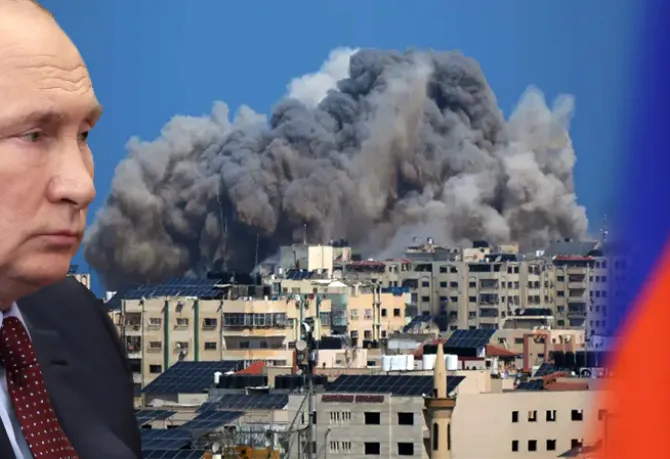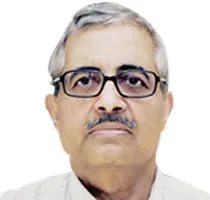
It has become an unfounded cliché to say that Moscow is a beneficiary of the current crisis in the Middle East (West Asia) triggered by an unprecedented Hamas attack against Israel on 7 October. The argument is that Israel’s war with Hamas distracts Western attention from the Russia-Ukraine military conflict and may even lead to disruptions of military supplies to Kyiv. While this may be true, the rising tensions in the region have posed a considerable challenge for Russia as it is forced to carefully navigate between the partners who are frenemies and adversaries to one another.
Russia’s role in the Middle East
Since 2015, when Russia intervened in the Syrian civil war by sending its air force and a limited military contingent, Moscow has been viewed as a key power broker in the region. Russia has been promoting itself as a mediator and a stabilising force beyond Syria, especially in the Mashreq sub-region where it has been involved in the settlement of the Palestine-Israel conflict[1] and the situation in Lebanon[2].
The argument is that Israel’s war with Hamas distracts Western attention from the Russia-Ukraine military conflict and may even lead to disruptions of military supplies to Kyiv.
Having their own imperatives for maintaining healthy ties with Russia, the Middle Eastern powers have been reluctant to follow the United States (US) sanctions against the Russian economy and instead emerged as logistical hubs for supplies of critical goods and materials to Russia. Russia’s economic relations with Türkiyé have been burgeoning. Iran has turned into a strategic partner and a supplier of much-needed defence equipment to Russia. Saudi Arabia has been coordinating closely on oil outputs effectively regulating the oil market and prices, while the United Arab Emirates (UAE) has provided a safe harbour for the Russian capital. Egypt has maintained neutrality on the Russia-Ukraine conflict and resisted the calls to send weapons to Kyiv. However, the conflict in Ukraine has affected Russia’s standing in the region. Bilateral ties with Israel were under strain, particularly with the government of Prime Minister Yair Lapid. After Netanyahu returned to power, the relationship has been more balanced probably because of his personal relationship with President Putin. Moscow appreciates Israel’s approach of being outspoken about Russia’s actions in Ukraine but refusing to supply Ukraine with weaponry. Even though economic cooperation and close people-to-people ties have been important drivers of the Israel-Russia relationship, Tel Aviv’s closeness to Washington has been a limitation for the partnership.
After Netanyahu returned to power, the relationship has been more balanced probably because of his personal relationship with President Putin.
However, it is the elevation of ties with Tehran that has been the most consequential change in Russia’s Middle East policy since February 2022. In contrast to many other Russian partners in the region, Iran has been providing both military and political support which led to the mitigation of the bilateral divergences of the past and paved the way for quick progress in forging strategic ties. Another important connector that has united Russia and Iran is the shared explicit anti-West outlook. As for Syria, being overly focused on the Ukraine theatre, Russia could not bolster its military presence in the region. Moscow’s plans to establish a naval logistics facility at Port Sudan have not materialised. It has developed its naval base in Tartus, Syria, and deployed the S400 and S300 surface-to-air missile systems at Hmeimim airbase in Syria. However, these have been used selectively and have not prevented Israel from hitting the Syrian regime’s military infrastructure and the pro-Iranian proxies. Coupled with a limited military presence, Moscow has retained some space for its diplomacy over Syria and is in touch with Türkiyé and Iran in the ‘Astana Format’— although the trio will have to find a new venue for talks.
Moscow’s plans to establish a naval logistics facility at Port Sudan have not materialised.
At the same time, many regional developments have moved forward without Moscow’s participation. It is China which managed to broker the Saudi-Iran deal allowing for diplomatic contacts between Tehran and Riyadh. It is the US which has facilitated the Abraham Accords, normalising Israel’s relations with UAE, Bahrain, Morocco, and Sudan. These paved the way for various US-led economic initiatives in the region, like the I2U2 (India-Israel-UAE-US) grouping and an ambitious project of India-Middle East-Europe corridor (IMEC), which are reliant on the healthy ties between Israel and the Gulf monarchies.
Non-terrorists who practice terror
Meanwhile, Moscow’s official statements on the current crisis make little of Hamas’s initial attack on Israel, continuously referring to the conflict between Israel and Palestine. Russian officialdom seems to imply that the attack on 7 October was just another act in a never-ending conflict which cannot be resolved unless the formula of the two-state solution is put into effect. Moscow’s approach to the conflict is based on its long-held vision in which both sides are responsible for the enduring violence. This view was encapsulated by Yevgeny Primakov, Former Prime Minister of Russia, whose legacy still influences Russian foreign policy making: “…Israeli actions claim the lives of Palestinian civilians, including women and children, as “retaliation” not only for terrorist acts against Israeli civilians, but also for armed clashes with Israeli soldiers in occupied territory […], [whereas] the Palestinian side often justifies terrorist acts as a response to Israeli military actions against civilians. The result is a vicious circle of terrorist violence that cannot be broken if one type of terrorism is regarded as a crime and another as justified.” Echoing Primakov’s vision, Vladimir Putin in his comments about the current Israel-HAMAS war noted: “Israel has, of course, faced an unprecedented attack that has never been seen before in history, not only in terms of its scale, but also in terms of the nature of its execution, its brutality [...]. Israel is responding on a massive scale and also with quite brutal methods.” Remarkably, if one goes by the Presidential website, when the Russian President expressed his condolences to Israeli victims and their families—only nine days after the tragedy—in his conversation with Prime Minister Benjamin Netanyahu, he appears to have omitted to name Hamas as responsible for the attack. Hamas was also not called out in the Russia-proposed resolution at the UN Security Council—one of the reasons it failed to garner support from the other members.
Moscow’s approach to the conflict is based on its long-held vision in which both sides are responsible for the enduring violence.
It is worth recalling that, unlike the US, United Kingdom (UK), European Union (EU), Israel, and some other countries, Russia officially does not consider Hamas a terrorist organisation, although its approach to the grouping has seen different turns. As Russia-Israel relations were improving in the early 1990s, the Russian representatives did not mince words labelling Hamas as “Islamic fanatics” and “extremists” and calling their acts “inhuman crimes” and “criminal and reckless wrongdoing.” Moscow’s rhetoric changed after Hamas won the 2006 elections as in Russia’s eyes, it transitioned from being a radical opposition into a legitimate power. Russia was also among the first to host the then-leader of the Hamas Political Bureau Khaled Mashal, thus granting his movement international legitimacy. During his visit to Syria in May 2010, the then Russian President Dmitry Medvedev met with Mashal and the President of Syria Bashar al-Assad. It is, however, in Syria in the 2010s, that Russia and HAMAS parted ways as Moscow stood by Assad while Hamas sided with the opposition forces. Even despite this divergence, Moscow refrained from describing Hamas as terrorists, firmly believing that they are “an integral part of Palestinian society” with representatives in the national legislature and government of national unity.
Russia was also among the first to host the then-leader of the Hamas Political Bureau Khaled Mashal, thus granting his movement international legitimacy.
Since 2022, on multiple occasions, Moscow has hosted HAMAS delegations led by the Political Bureau Chief Ismail Haniyeh who held talks with Russian officials, including Foreign Minister Sergey Lavrov and his deputy Mikhail Bogdanov who is in charge of the Middle Eastern region. These contacts aim to signal Israel about the long-standing efforts by Moscow to mediate between different Palestinian factions. As the conflict between Hamas and Israel enters the third week and Hamas holds hostages, including two Russian citizens, the established ties with the political wing of the grouping have so far not helped Moscow rescue these people. Given the complexity of the current conflict between Israel and Hamas and its potential to escalate further across the region, Russia will likely go ahead with its diplomatic efforts to bring the tensions to an end. The extension of the war to the territories of Syria and Lebanon, let alone a direct clash between Israel and Iran, would be detrimental to Moscow’s interests as it is currently not ready to engage in any military kerfuffle far away from its borders.
Nandan Unnikrishnan is a Distinguished Fellow at the Observer Research Foundation. Aleksei Zakharov is a Visiting Fellow with the Strategic Studies Programme at the Observer Research Foundation.
[1] Russia had been a member of the Middle East Quarter (US, EU, Russia, UN), which coordinated their approaches toward the Palestine-Israel conflict from 2002 to 2021, and has also been engaging separately with Israel and seeking to act as a mediator between Fatah and Hamas. [2] During the government crisis in Lebanon in 2021, Moscow had been in talks with different parties – the Hezbollah, the leader of the Future Movement and then-Prime Minister Saad Hariri, and the leader of Free Patriotic Movement Gebran Bassil.
The views expressed above belong to the author(s). ORF research and analyses now available on Telegram! Click here to access our curated content — blogs, longforms and interviews.




 PREV
PREV


